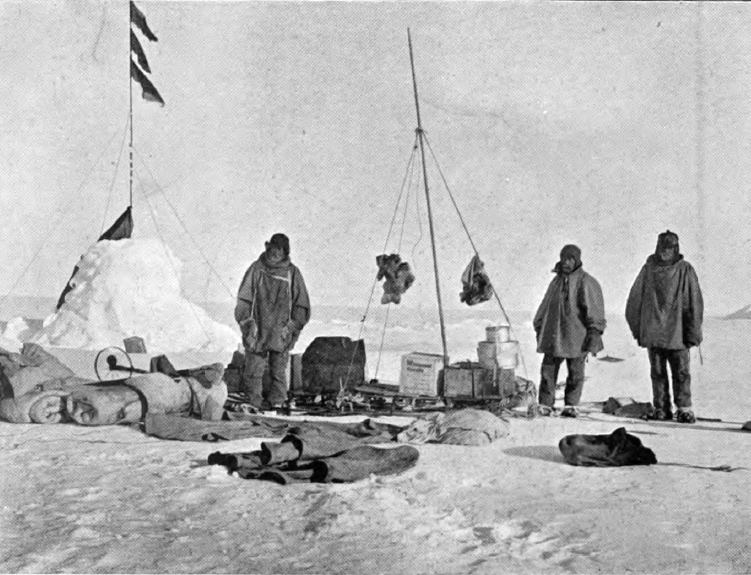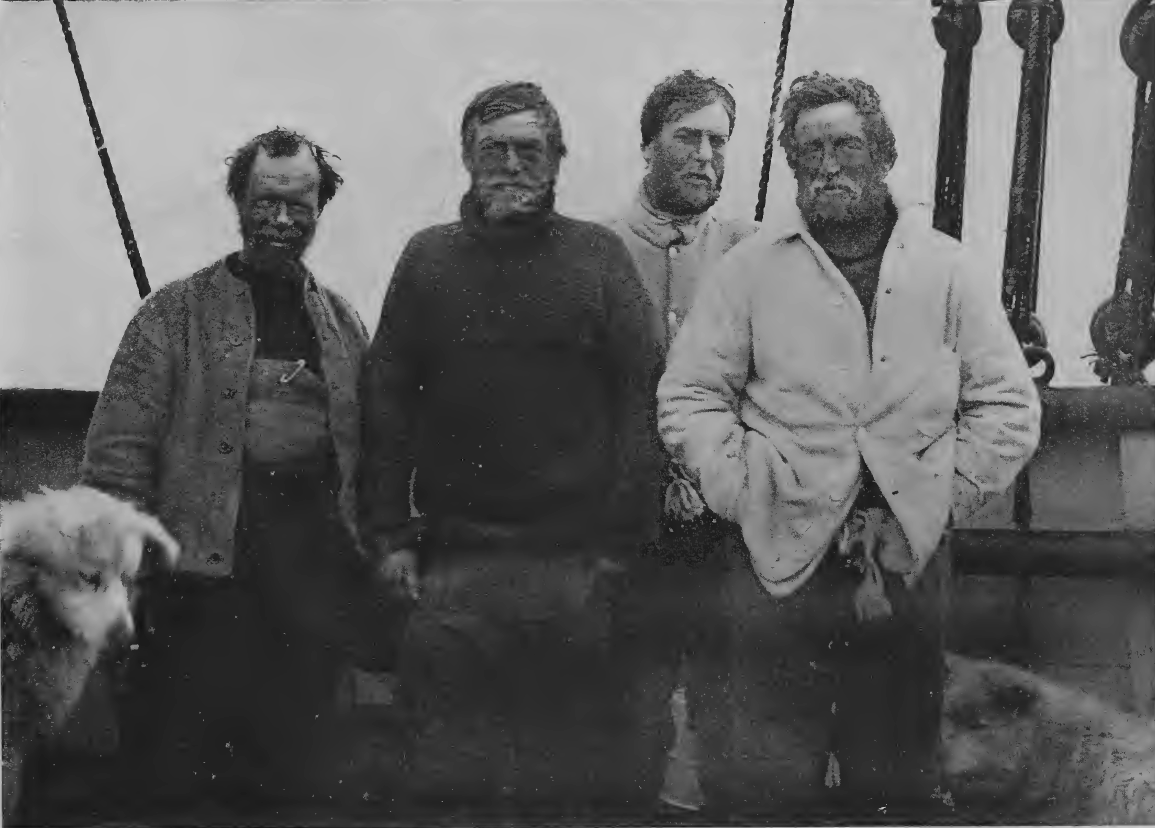| Web
and Book design,
Copyright, Kellscraft Studio 1999-2018 (Return to Web Text-ures) |
 (HOME)
|
| CHAPTER XVII
THE FINAL STAGE FEBRUARY 23 TO MARCH 4 Bluff Depot reached: Marshall's Condition worse on February 25: Marshall and Adams remain in Camp while Shackleton and Wild make a Forced March to Hut Point: On board Nimrod: Relief Party start to bring in Marshall and Adams: All Safe on Board Ship March 4, 1908 February
24.
We got up at 5 A.M., and at 7 A.M. had breakfast, consisting of eggs,
dried
milk, porridge, and pemmican, with plenty of biscuits. We marched until
1 P.M.,
had lunch and then marched until 8 rat., covering a distance of fifteen
miles
for the day. The weather was fine. Though we have plenty of weight to
haul now
we do not feel it so much as we did the smaller weights when we were
hungry. We
have good food inside us, and every now and then on the march we eat a
bit of chocolate
or biscuit. Warned by the experience of Scott and Wilson on the
previous
southern journey, I have taken care not to over-eat. Adams has a
wonderful
digestion, and can go on without any difficulty. Wild's dysentery is a
bit
better to-day. He is careful of his feeding and has only taken things
that are
suitable. It is a comfort to be able to pick and choose. I cannot
understand a
letter I received from Murray about Mackintosh getting adrift on the
ice, but
no doubt this will be cleared up on our return. Anyhow, every one seems
to be
all right. There was no news of the Northern Party or of the Western
Party. We
turned in full of food to-night. February
25.
We turned out at 4 A.M. for an early start, as we are in danger of
being left
if we do not push ahead rapidly and reach the ship. On going into the
tent for
breakfast I found Marshall suffering from paralysis of the stomach and
renewed
dysentery, and while we were eating a blizzard came up. We secured
everything
as the Bluff showed masses of ragged cloud, and I was of opinion that
it was
going to blow hard. I did not think Marshall fit to travel through the
blizzard. During the afternoon, as we were lying in the bags, the
weather
cleared somewhat, though it still blew hard. If Marshall is not better
to-night,
I must leave him with Adams and push on, for time is going on, and the
ship may
leave on March 1, according to orders, if the Sound is not clear of
ice. I went
over through the blizzard to Marshall's tent. He is in a bad way still,
but
thinks that he could travel to-morrow. February 27
(1 A.M.). The blizzard was over at midnight, and we got up at 1 A.M.,
had
breakfast at 2, and made a start at 4. At 9.30 A.M. we had lunch, at 3
P.M.
tea, at 7 P.M. hoosh, and then marched till 11 P.M. Had another hoosh,
and
turned in at 1 A.M. We did twenty-four miles. Marshall suffered
greatly, but
stuck to the march. He never complains.  RETURN JOURNEY OF THE SOUTHERN PARTY: AT THE BLUFF DEPOT March 5.
Although we did not turn in until 1 A.M. on Feb. 27th, we were up again
at 4 A.M.
and after a good hoosh, we got under way at 6 A.M. and marched until 1
P.M.
Marshall was unable to haul, his dysentery increasing, and he got worse
in the
afternoon, after lunch. At 4 P.M. I decided to pitch camp, leave
Marshall under
Adams' charge, and push ahead with Wild, taking one day's provisions
and
leaving the balance for the two men at the camp. I hoped to pick up a
relief
party at the ship. We dumped everything off the sledge except a
prismatic
compass, our sleeping-bags and food for one day, and at 4.30 P.M. Wild
and I
started, and marched till 9 P.M. Then we had a hoosh, and marched until
2 A.M.
of the 28th, over a very hard surface. We stopped for one hour and a
half off
the north-east end of White Island, getting no sleep, and marched till
11 A.M.,
by which time our food was finished. We kept flashing the heliograph in
the
hope of attracting attention from Observation Hill, where I thought
that a
party would be on the look-out, but there was no return flash. The only
thing
to do was to push ahead, although we were by this time very tired. At
2.30 P.M.
we sighted open water ahead, the ice having evidently broken out four
miles
south of Cape Armitage, and an hour and a half later a blizzard wind
started to
blow, and the weather got very thick. We thought once that we saw a
party
coming over to meet us, and our sledge seemed to grow lighter for a few
minutes, but the "party" turned out to be a group of penguins at the
ice-edge. The weather was so thick that we could not see any distance
ahead,
and we arrived at the ice edge suddenly. The ice was swaying up and
down, and
there was grave risk of our being carried out. I decided to abandon the
sledge,
as I felt sure that we would get assistance at once when we reached the
hut,
and time was becoming important. It was necessary that we should get
food and
shelter speedily. Wild's feet were giving him a great deal of trouble.
In the
thick weather we could not risk making Pram Point, and I decided to
follow
another route seven miles round by the other side of Castle Rock. We
clambered
over crevasses and snow slopes, and after what seemed an almost
interminable
struggle reached Castle Rock, from whence I could see that there was
open water
all round the north. It was indeed a different home-coining from what
we had
expected. Out on the Barrier and up on the plateau our thoughts had
often
turned to the day when we would get back to the comfort and plenty of
the
winter quarters, but we had never imagined fighting our way to the
back-door, so
to speak, in such a cheerless fashion. We reached the top of Ski Slope
at 7.45 P.M.,
and from there we could see the hut and the bay. There was no sign of
the ship,
and no smoke or other evidence of life at the hut. We hurried on to the
hut,
our minds busy with gloomy possibilities, and found not a man there.
There was
a letter stating that the Northern Party had reached the Magnetic Pole,
and
that all the parties had been picked up except ours. The letter added
that the
ship would be sheltering under Glacier Tongue until February 26. It was
now
February 28, and it was with very keen anxiety in our minds that we
proceeded
to search for food. If the ship was gone, our plight, and that of the
two men
left out on the Barrier, was a very serious one. We improvised a
cooking vessel,
found oil and a Primus lamp, and had a good feed of biscuit, onions,
and plum
pudding, which were amongst the stores left at the hut. We were utterly
weary
but we had no sleeping-gear, our bags having been left with the sledge,
and the
temperature was very low. We found a piece of roofing felt, which we
wrapped
round us, and then we sat up all night, the darkness being relieved
only when
we occasionally lighted the lamp in order to secure a little warmth. We
tried
to burn the magnetic hut in the hope of attracting attention from the
ship, but
we were not able to get it alight. We tried, too, to tie the Union Jack
to
Vince's cross, on the hill, but we were so played out that our cold
fingers
could not manage the knots. It was a bad night for us, and we were glad
indeed
when the light came again. Then we managed to get a little warmer, and
at 9 A.M.
we got the magnetic hut alight, and put up the flag. All our fears
vanished when in the
distance we saw the ship, miraged up. We signalled with the heliograph,
and at
11 A.M. on March 1 we were on board the Nimrod
and once more safe amongst friends. I will not attempt to describe our
feelings. Every one was glad to see us, and keen to know what we had
done. They
had given us up for lost, and a search-party had been going to start
that day
in the hope of finding some trace of us. I found that every member of
the
expedition was well, that the plans had worked out satisfactorily, and
that the
work laid down had been carried out. The ship had brought nothing but
good news
from the outside world. It seemed as though a great load had been
lifted from
my shoulders. The first thing
was to bring in
Adams and Marshall, and I ordered out a relief party at once. I had a
good feed
of bacon and fried bread, and started at 2.30 P.M. from the Barrier
edge with
Mackay, Mawson, and McGillan, leaving Wild on the Nimrod.
We marched until 10 P.M., had dinner and turned in for a
short sleep. We were up again at 2 A.M. the next morning (March 2), .4
and
travelled until 1 P.M., when we reached the camp where I f had left the
two
men. Marshall was better, the rest having done him a lot of good, and
he was
able to march and pull. After lunch we started back again, and marched
until 8
P.M. in fine weather. We were under way again at 4 A.M. the next
morning, had
lunch at noon, and reached the ice-edge at 3 P.M. There was no sign of
the
ship, and the sea was freezing over. We waited until 5 P.M., and then
found
that it was possible to strike land at Pram Point. The weather was
coming on
bad, clouding up from the south-east, and Marshall was suffering from
renewed
dysentery, the result of the heavy marching. We therefore abandoned one
tent
and one sledge at the ice-edge, taking on only the sleeping-bags and
the
specimens. We climbed up by Crater Hill, leaving everything but the
sleeping-bags, for the weather was getting worse, and at 9.35 P.M.
commenced to
slide down towards Hut Point. We reached the winter quarters at 9.50,
and
Marshall was put to bed. Mackay and I lighted a carbide flare on the
hill by
Vince's cross, and after dinner all hands turned in except Mackay and
myself. A
short time after Mackay saw the ship appear. It was now blowing a hard
blizzard, but Mackintosh had seen our flare from a distance of nine
miles. Adams
and I went on board the Nimrod, and
Adams, after surviving all the dangers of the interior of the Antarctic
continent, was nearly lost within sight of safety. He slipped at the
ice-edge,
owing to the fact that he was wearing new finnesko, and he only just
saved
himself from going over. He managed to hang on until he was rescued by
a party
from the ship. A boat went
back for Marshall and
the others, and we were all safe on board at 1 A.M. on March 4.  THE SOUTHERN PARTY ON BOARD THE "NIMROD." LEFT TO RIGHT: WILD, SHACKLETON, MARSHALL, ADAMS |